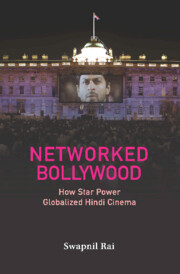Book contents
- Frontmatter
- Dedication
- Contents
- List of Figures
- List of Tables
- Acknowledgements
- List of Abbreviations
- Introduction: Star Switching Power in Networked Bollywood
- 1 Of Vagabonds and Wayfarers: Raj Kapoor, Dev Anand, and Hindi Cinema’s Family-Led Film Clusters
- 2 King of Kings: Amitabh Bachchan and the Emergence of Bollywood’s Corporate Networks
- 3 Global Dreamz: Shah Rukh Khan and Aamir Khan Usher Global Bollywood into the New Millennium
- 4 Global Beauty Queens: Aishwarya Rai, Priyanka Chopra, and Female Star Switching Power
- 5 Bards of Change: How Streaming Platforms and State–Industry Alliance Are Reconfiguring Star Power in Networked Bollywood
- Notes
- Index
2 - King of Kings: Amitabh Bachchan and the Emergence of Bollywood’s Corporate Networks
Published online by Cambridge University Press: 09 January 2024
- Frontmatter
- Dedication
- Contents
- List of Figures
- List of Tables
- Acknowledgements
- List of Abbreviations
- Introduction: Star Switching Power in Networked Bollywood
- 1 Of Vagabonds and Wayfarers: Raj Kapoor, Dev Anand, and Hindi Cinema’s Family-Led Film Clusters
- 2 King of Kings: Amitabh Bachchan and the Emergence of Bollywood’s Corporate Networks
- 3 Global Dreamz: Shah Rukh Khan and Aamir Khan Usher Global Bollywood into the New Millennium
- 4 Global Beauty Queens: Aishwarya Rai, Priyanka Chopra, and Female Star Switching Power
- 5 Bards of Change: How Streaming Platforms and State–Industry Alliance Are Reconfiguring Star Power in Networked Bollywood
- Notes
- Index
Summary
I remember Amitabh Bachchan was going to come to Kabul in the 1980s. Unfortunately, that time war was going on, and a girl walked up to the President and requested him to ask the warring parties to stop [fighting] for a day for the sake of Amitabh Bachchan.
—Shaida Mohammad Abdali, Afghanistan’s ambassador to India (2012–2018)In war-torn Afghanistan, ‘one thing that all Mujahideen groups agreed on was Amitabh Bachchan’. President Mohammad Najibullah’s (1987–1992) repeated insistence that Bachchan make a film in Afghanistan attests to the actor’s prodigious fandom. Consequently, Bachchan’s Khuda Gawah (God Is My Witness, 1992, dir. Mukul S. Anand), in which he played an irreproachable Pathan, part of the dominant ethnic group in Afghanistan, was shot there. His popularity spanned other parts of the world as well: Egypt, parts of the Middle East, Nigeria, and West Asia. Omar Sharif, the Egyptian actor known for his Hollywood roles, noted, ‘[T]his Amitabh Bachchan seems to be more popular than me in Egypt.’ Not surprisingly, Bachchan was chosen as the star of the millennium in a 1999 British Broadcasting Corporation (BBC) poll, beating Lawrence Olivier, Charlie Chaplin, Cary Grant, Robert De Niro, and Marilyn Monroe, among others. Not only was his stardom global, but he also had political and economic clout in equal measure. His near-fatal accident on the set of the film Coolie (1983, dir. Manmohan Desai) summoned prime minister Indira Gandhi and her son, Rajiv, to his bedside and sent the nation into mourning. Two years hence, Bachchan ran for a seat in parliament on Gandhi’s Congress party ticket, winning by a landslide. In the 1970s, 1980s, and early 1990s, the Indian cinemascape abounded with Bachchan, earning him the moniker of Hindi cinema’s shahenshah (king of kings).
This chapter spans the mid-1970s to the early 2000s when Bachchan dominated Hindi cinema’s landscape locally and globally, explicating his protean star switching power in the sociocultural, political, and economic realms that enabled him to be a significant change-maker for the film and entertainment industry. The chapter presents a triptych that illustrates (a) the emergent Bollywood network, (b) the key nodes that get added to it in this incipient phase of globalization, and (c) the switching power Bachchan—the king of kings—has within it.
- Type
- Chapter
- Information
- Networked BollywoodHow Star Power Globalized Hindi Cinema, pp. 77 - 117Publisher: Cambridge University PressPrint publication year: 2024



